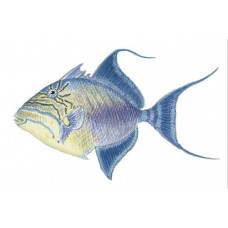Latin name
Balistes vetula
Other names
No information
Identification
This fish has a compressed body, and the powerful first spine of the dorsal fin is fixed in an elevated position by a much shorter second dorsal spine, which slides forward. The long first spine can only be lowered again by sliding the second spine back. This can be done by pushing the third spine, the "trigger," which is attached at its bony base to the second spine. By lifting the first spine and locking it in place, the fish can be immobilized in the crevices. The second dorsal and anal fins are the same size and shape. The pelvic fins are absent, and the belly has a pointed outline, with the greatest depth just before the anal fin. The fish is covered with a shell of bony plates. Its leathery skin is devoid of mucus or mucous secretions, and it can rotate each eyeball independently. It usually swims by waving its second dorsal and anal fins, but uses its tail for quick jerks.
Distribution
Triggerfish inhabit the Atlantic, Indian and Pacific Oceans. Queen triggerfish (Balistes vetula) are found in warm waters of the western Atlantic north to the Caroline Islands, as well as in the Caribbean. Gray triggerfish (B. capriscus) are common in the warm Atlantic and Gulf of Mexico, going further north than most triggerfish. Ocean triggerfish are found off the coast of Florida and in the Caribbean.
Habitat
Triggerfish inhabit coral reefs.
Size
Queen triggerfish are caught weighing up to 12 pounds. Gray triggerfish can weigh over 13 pounds. Ocean triggerfish (Canthidermis sufflamen) can also weigh over 13 pounds.
Life history and Behavior
Queen triggerfish usually travel alone or in pairs, but can sometimes be seen in small groups.
Food and feeding habits
No information
Reproduction
No information
| Classification | |
| Phylum | Chordata |
| Class | Actinopterygii |
| Squad | Tetraodontiformes |
| Family | Balistidae |
| Features | |
| Conservation status | No information |
| Habitat | Bottom |
| Life span, years | No information |
| Maximum body weight, kg | No information |
| Maximum length, cm | 100 |
| Sailing speed, m/s | No information |
| Threat to people | Poisonous |
| Way of eating | Predator |




